In the quest for natural remedies to enhance your pet’s well-being, honey stands out as a remarkable option. Esteemed for centuries for its therapeutic properties, honey is now gaining popularity among dog owners seeking a holistic approach to canine care. Rich in nutrients and possessing natural healing capabilities, honey offers a myriad of health benefits for dogs, from wound healing to digestive aid. However, it’s crucial to navigate its use with knowledge and caution to ensure the safety and health of your furry companions. This post delves into the healing power of honey in canine health, exploring its benefits, safe practices, and application.
The Healing Properties of Honey
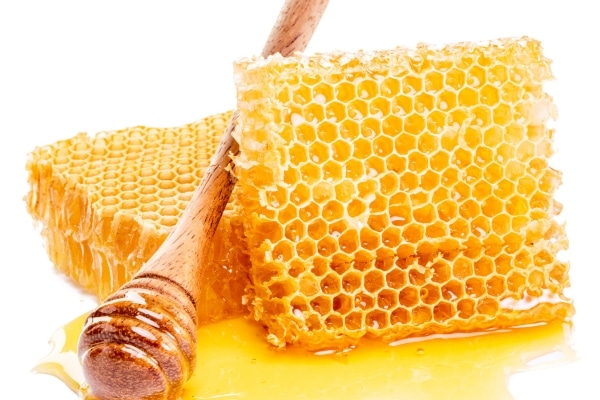
Honey’s reputation as a potent healer is backed by its antibacterial and anti-inflammatory properties. These attributes make it an excellent choice for treating minor cuts and abrasions in dogs. The high sugar content of honey creates an environment that inhibits bacterial growth, while its acidic nature speeds up the healing process. By applying honey to a wound, you’re not only preventing infection but also promoting faster healing.
Moreover, honey’s anti-inflammatory properties can significantly reduce swelling and pain associated with wounds and skin irritations. This makes it a gentle, natural remedy for dogs experiencing discomfort from minor injuries. Unlike some chemical treatments that may have adverse side effects, honey offers a soothing, side-effect-free option for managing your dog’s ailments. It’s a testament to the power of nature in nurturing the health and well-being of your pet.
Nutritional Benefits of Honey for Dogs

Honey is not just beneficial for its healing properties; it’s also a powerhouse of essential vitamins, minerals, and antioxidants. These nutrients contribute to the overall health and vitality of dogs, supporting functions from energy production to immune defense. Antioxidants in honey, for example, can help combat oxidative stress, reducing the risk of chronic diseases and supporting healthy aging in dogs.
In addition to its antioxidant capacity, honey provides dogs with a natural energy boost. The simple sugars in honey are easily absorbed by the body, offering a quick source of energy that is ideal for active or working dogs. This makes honey a healthy supplement to your dog’s diet, contributing to their daily nutritional needs while supporting their active lifestyle. However, moderation is key to avoiding any adverse effects from overconsumption.
Safe Honey Practices for Canine Care
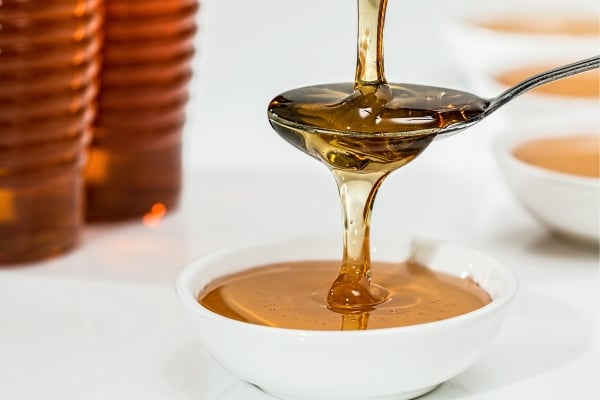
When incorporating honey into your dog’s care regimen, selecting the right type of honey is crucial. Raw, unprocessed honey is preferable because it retains its full range of healing properties and nutrients. Processed honey, on the other hand, often lacks the enzymes and antioxidants that make raw honey so beneficial. Therefore, choosing raw honey ensures your dog reaps the maximum health benefits.
However, it’s also important to be mindful of the quantity of honey you give to your dog. Due to its high sugar content, overfeeding honey can lead to weight gain and tooth decay. As a general guideline, dogs should only consume honey in small, controlled amounts—a teaspoon for small dogs and a tablespoon for larger breeds. This ensures they enjoy the benefits of honey without any negative repercussions on their health.
Honey in Wound Care
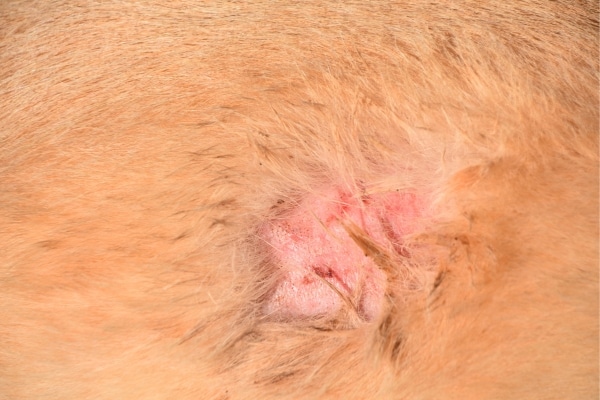
Applying honey topically to your dog’s minor wounds can be a safe and effective way to promote healing. Thanks to its antibacterial properties, honey acts as a natural ointment, preventing infection and accelerating the healing process. By forming a protective barrier on the wound, it also keeps the area clean and free from external contaminants. This method of wound care has been utilized for centuries, highlighting honey’s enduring value in natural healing practices.
Yet, it’s essential to recognize when a wound is beyond home care and requires veterinary attention. If a wound is deep, excessively bleeding, or shows signs of infection, such as swelling, redness, or pus, professional medical treatment is necessary. In these cases, honey can complement, but not replace, the advice and treatment provided by a veterinarian. This underscores the importance of discerning the appropriate use of honey in canine wound care.
Honey for Digestive and Throat Relief
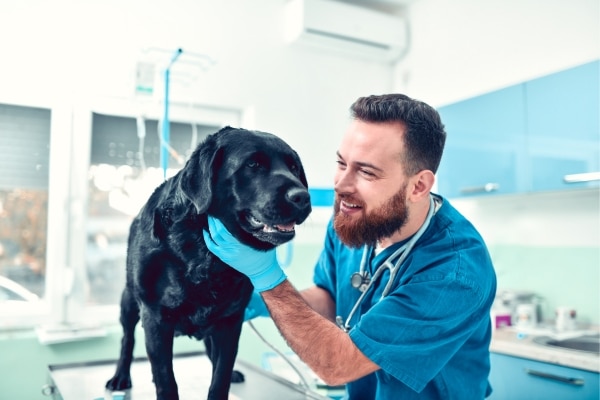
Honey’s soothing properties extend beyond external applications; it also serves as a gentle remedy for digestive issues and throat irritation in dogs. When consumed in moderation, honey can help soothe the lining of the stomach and alleviate symptoms of minor gastrointestinal upset, such as indigestion or nausea. Its natural sugars can also stimulate appetite in dogs who may be reluctant to eat due to illness or stress, encouraging them to maintain their strength during recovery.
Furthermore, for dogs suffering from a sore throat or cough, honey acts as a natural cough suppressant and throat soother. Its thick consistency coats the throat, reducing irritation and coughing frequency. This can be particularly beneficial during cold seasons or for dogs prone to kennel cough. However, it’s crucial to use honey as a complement to, not a substitute for, veterinary care in cases of persistent or severe symptoms.
Honey as an Energy Booster

The natural sugars in honey provide a quick, easily digestible energy source, making it an excellent supplement for active dogs or those needing a little extra boost. Whether it’s a working dog with high energy demands or an older dog needing some help to maintain their energy levels, a small amount of honey can make a significant difference. It’s simple carbohydrates offer instant fuel, helping to enhance stamina and performance during physical activities.
In addition to boosting energy, honey’s nutrients support overall health, contributing to a stronger immune system and improved endurance over time. This makes honey a quick energy solution and a long-term supplement for maintaining vitality and well-being in dogs. Integrating honey into your dog’s diet, especially before activities or as they age, can help keep them active and healthy, provided it’s done within the recommended limits to avoid any adverse effects.
Potential Risks and Considerations
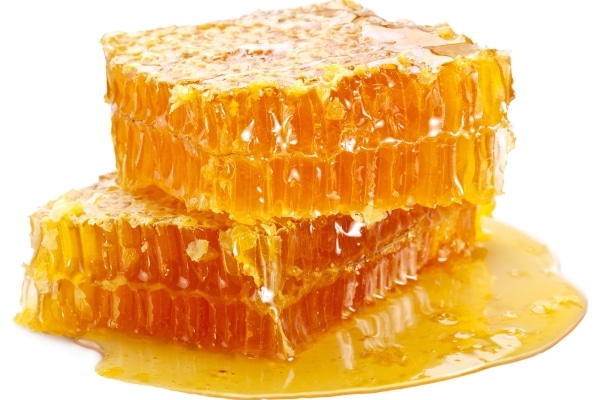
While honey offers numerous benefits for dogs, it’s essential to be aware of its potential risks and considerations. Overconsumption of honey can lead to weight gain and an increased risk of tooth decay due to its high sugar content. Dogs with diabetes or those prone to obesity should consume honey with caution under the guidance of a veterinarian. Similarly, the caloric intake from honey needs to be balanced with the overall diet to prevent nutritional imbalances.
Another significant consideration is the risk of botulism. Raw honey can contain botulism spores, which are harmful to dogs with compromised immune systems, very young puppies, or dogs with pre-existing health conditions. For these dogs, the risks associated with consuming honey may outweigh the benefits. Always consult with a veterinarian before introducing honey or any new supplement into your dog’s diet, especially if your dog falls into one of these vulnerable categories.
Explore Nature’s Nectar for Nurturing Paws
Adding honey to your dog’s care routine unveils a path to harness nature’s essence for their health and happiness. As you navigate the use of this golden elixir, the key lies in balancing its sweet benefits with mindful consideration, ensuring your beloved pets enjoy its blessings safely. Through informed, attentive application, honey not only sweetens the lives of your canine friends but also enriches your journey in nurturing them toward a vibrant, thriving existence.